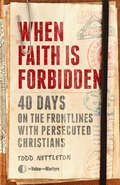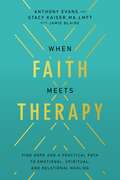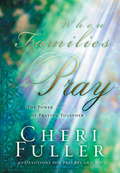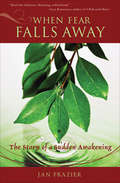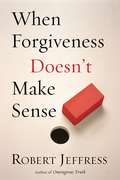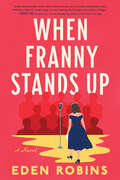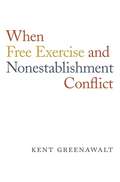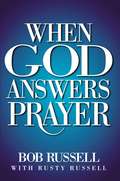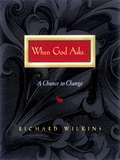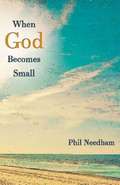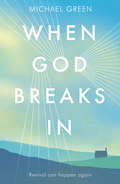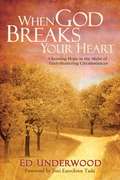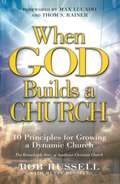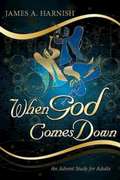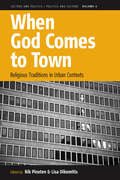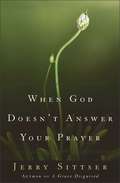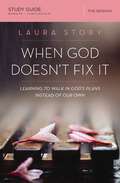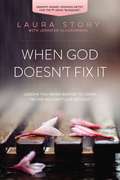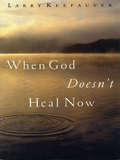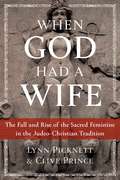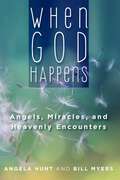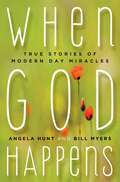- Table View
- List View
When Faith Is Forbidden: 40 Days on the Frontlines with Persecuted Christians
by The Voice of the Martyrs Todd NettletonJourney alongside Persecuted ChristiansTake a 40-day journey to meet brothers and sisters who share in the sufferings of Christ. When Faith Is Forbidden takes you to meet a Chinese Christian woman who called six months in prison "a wonderful time," an Iraqi pastor and his wife just eight days after assassins' bullets ripped into his flesh, and others from our spiritual family who've suffered greatly for wearing the name of Christ. Each stop on this 40-day journey includes inspiration and encouragement through the story of a persecuted believer. You&’ll also find space for reflection and a suggested prayer as you grow to understand the realities of living under persecution—and learn from the examples of the bold believers you'll meet.For more than 20 years, Todd Nettleton (host of The Voice of the Martyrs Radio) has traveled the world to interview hundreds of Christians who&’ve been persecuted for the name of Christ. Now he opens his memory bank—and even his personal journals—to take you along to meet bold believers who will inspire you to a deeper walk with Christ.
When Faith Is Forbidden: 40 Days on the Frontlines with Persecuted Christians
by The Voice of the Martyrs Todd NettletonJourney alongside Persecuted ChristiansTake a 40-day journey to meet brothers and sisters who share in the sufferings of Christ. When Faith Is Forbidden takes you to meet a Chinese Christian woman who called six months in prison "a wonderful time," an Iraqi pastor and his wife just eight days after assassins' bullets ripped into his flesh, and others from our spiritual family who've suffered greatly for wearing the name of Christ. Each stop on this 40-day journey includes inspiration and encouragement through the story of a persecuted believer. You&’ll also find space for reflection and a suggested prayer as you grow to understand the realities of living under persecution—and learn from the examples of the bold believers you'll meet.For more than 20 years, Todd Nettleton (host of The Voice of the Martyrs Radio) has traveled the world to interview hundreds of Christians who&’ve been persecuted for the name of Christ. Now he opens his memory bank—and even his personal journals—to take you along to meet bold believers who will inspire you to a deeper walk with Christ.
When Faith Meets Therapy: Find Hope and a Practical Path to Emotional, Spiritual, and Relational Healing
by Stacy Kaiser Anthony EvansThe power of faith intersects with the practicality of counseling in this unique partnership of a faith/worship leader and a therapist as they offer a pathway for readers to find help, hope, healing, and freedom while navigating life&’s struggles.No one is immune from life&’s difficulties, yet many people are reluctant to talk about mental health or seek professional help when they are struggling. People of faith who are battling issues such as anxiety, depression, life changes, stress, or relationship problems may suffer in silence, believing things will get better if only their faith was stronger, they prayed more, or they had more self-discipline. The stigma about needing to seek help is all too real.But seeking professional help isn&’t a sign of weakness; it&’s a sign that someone is serious about moving forward emotionally, relationally, and spiritually. Written by producer, artist, and author Anthony Evans, along with licensed psychotherapist Stacy Kaiser, When Faith Meets Therapy dispels the cultural myths and stigmas that surround professional therapy;shares stories from the authors&’ personal experiences and from others who are facing life&’s challenges; andprovides practical steps that readers can take in the pursuit of emotional, relational, and spiritual progress.Anthony and Stacy met five years ago when he was seeking emotional and relational healing of his own. Stacy led Anthony through a process of internal renovation and continues as his personal therapist. When Faith Meets Therapy contains priceless, practical knowledge to break stereotypes that surround therapy while also offering immeasurable hope and encouragement.
When Families Pray
by Cheri FullerIt is a parent's greatest responsibility. Yet in this era of high-speed communication, few of them know how to connect their own families with God. Cheri Fuller shows how to discover the essence of prayer and experience the joy of communing with the Savior, as a family, for life. Thought-provoking questions will help parents and their kids see God in a new light. Scripture, present-day stories of answered prayer, and inspirational quotes will encourage families to begin a refreshing and rewarding lifelong walk with God.
When Fear Falls Away: The Story of a Sudden Awakening
by Jan Frazier&“Jan Frazier shows us the anatomy of epiphany and reminds us of the ever-present possibility of healing and freedom and grace.&” —Rachel Naomi Remen, MD, New York Times–bestselling author of Kitchen Table Wisdom In August 2003, virtually overnight, Jan Frazier experienced &“a dramatic falling away of fear&”—not just the immediate fear of her annual medical test but, as she learned as time went on, her fear of everything. She was &“flooded with a causeless joy that has never left me.&” In this book, the commonplace belief that enlightenment is only for saints comes apart at the seams. Anyone can be enlightened, and all we need to do is ask. This rare and beautiful account puts Jan Frazier solidly in the tradition of enlightened teachers from J. Krishnamurti to Byron Katie. Guns and money aren&’t going to buy peace of mind. Giving up fear is. &“A breathing translation into language of an advance in evolution that is available to the focused heart and the fortunate intention.&” —Stephen Levine, bestselling author of Unattended Sorrow: Recovering from Loss and Reviving the Heart &“Read this delicious, liberating, radical book.&” —Jack Kornfield, bestselling author of No Time Like the Present &“If you have ever wondered of a life filled with freedom and free of fear was possible, then this is the book for you. Jan Frazier shares her personal journey with a level of intimacy normally saved for one&’s closest confidantes. The result is a book that serves as a beacon for anyone who is ready to experience joy on every level.&”—Shelly Rachanow, author of If Women Ran the World, Sh*t Would Get Done
When Forgiveness Doesn't Make Sense
by Robert JeffressPrinciples of Christian living; discusses forgiveness.
When Franny Stands Up: A Novel
by Eden RobinsNamed a Best Book of the Month by Bustle and Buzzfeed!Named one of the best books of 2022 by Chicago Reader and All About Romance!As praised by Book Riot, Autostraddle, Library Journal, Publishers Weekly, Booklist, and more!The Marvelous Mrs. Maisel meets A League of Their Own in this inspiring story Buzzfeed calls "a warm hug of a novel." Franny Steinberg knows there's powerful magic in laughter. She's witnessed it. With the men of Chicago off fighting WWII on distant shores, Franny has watched the women of the city taking charge of the war effort. But amidst the war bond sales and factory shifts, something surprising has emerged, something Franny could never have expected. A new marvel that has women flocking to comedy clubs across the nation: the Showstopper.When Franny steps into Chicago's Blue Moon comedy club, she realizes the power of a Showstopper—that specific magic sparked when an audience laughs so hard, they are momentarily transformed. And while each comedian's Showstopper is different, they all have one thing in common: they only work on women.After a traumatic flashback propels her onstage in a torn bridesmaid dress, Franny discovers her own Showstopper is something new. And suddenly she has the power to change everything…for herself, for her audience, and for the people who may need it most.
When Free Exercise and Nonestablishment Conflict
by Kent Greenawalt“Congress shall make no law reflecting an establishment of religion or prohibiting the free exercise thereof.” The First Amendment aims to separate church and state, but Kent Greenawalt examines many situations in which its two clauses—the Nonestablishment Clause and the Free Exercise Clause—point in opposite directions. How should courts decide?
When God Answers Prayer
by Bob Russell Rusty RussellSome people are "prayer plodders": They pray not because prayer comes easy but because they believe in its power. Others are "prayer professionals": they are gifted in the practice of prayer; prayer seems to flow authentically and effectively from their hearts. Whether you are a plodder or a professional, you can be a prayer warrior-one whose prayers are powerful and effectual -- even efficient. The simple message of this book is that prayer works. Even if prayer doesn't always come easily or your prayers aren't always answered as you'd hoped, you will come away from this book convinced that God rewards genuine prayer. Open the pages of this book and see for yourself what happens when God answers prayer!
When God Asks
by Richard WilkinsThis book is based on a simple concept: Imagine God, the ultimate guest, comes to dinner and begins asking you some simple questions about your life... Do you complain about the lack of flowers or do you plant seeds? Do you create happiness or do you chase after it? Do you encourage more than you criticize? Do you place as much importance on how you think as how you look? Beautifully packaged, this thought provoking book will appeal to people of all faiths.
When God Becomes Small
by Phil NeedhamThe defining miracle of God’s greatness is the miracle of God becoming small. This miracle opens the door for us to know God and to experience fullness of life.From the author:"I am inviting you to consider the truth of God we rarely hear told. It is the surprising truth of his lowliness. It is God’s shocking humility."
When God Breaks In: Revival can happen again
by Canon Michael GreenDespite the growth of religion in general and Christianity in particular around the world, Western Europe and the UK remain overwhelmingly secular, with the church increasingly seen as backwards and irrelevant. In this provocative book well-known speaker and author Michael Green gives a snapshot of various different revivals from the UK's history, as well as describing how the early church started and focusing on various revivals around the world. Be bold, writes Michael - revival can happen again!
When God Breaks In: Revival can happen again
by Michael GreenDespite the growth of religion in general and Christianity in particular around the world, Western Europe and the UK remain overwhelmingly secular, with the church increasingly seen as backwards and irrelevant. In this provocative book well-known speaker and author Michael Green gives a snapshot of various different revivals from the UK's history, as well as describing how the early church started and focusing on various revivals around the world. Be bold, writes Michael - revival can happen again!
When God Breaks Your Heart
by Ed UnderwoodWhy is God letting this happen to me?If you have never asked this question, you someday will.There is perhaps no greater challenge to our faith than personal suffering. For pastor Ed Underwood this challenge came in the form of chronic leukemia. Though he prayed for and believed in God's healing, as the days slipped by and his pain became unbearable, Ed's heart was broken by a simple realization: The God who could do anything was not helping him. Yet a revelation from God's Word changed his heart and life forever.In this poignant journey from tragedy to hope, Ed takes a fresh look at the story of Lazarus and his sisters--a story that explores suffering through the eyes of our Lord and His people. You'll find comfort during difficulty, be inspired to ask for the impossible, and discover a God whose heart breaks with yours.
When God Builds a Church: 101 Principles for Growing a Dynamic Church
by Bob Russell Rusty RussellPastor Bob Russell shares the ten principles upon which Southeast Christian Church, one of the largest and fastest growing churches in America, was founded. He shares not only the story of one of the most amazing churches in America, but also what your church can become if you follow the principles and allow God to build your church.Can the church truly be the "city on a hill that cannot be hidden" that Jesus talked about in the Sermon on the Mount? Can it grow large enough to attract throngs of seekers and yet be loving enough to care for each individual that comes? Bob Russell, pastor of Southeast Christian Church—one of the largest and fastest growing churches in America—says that it most certainly can. But it can only be done when we are submissive to God's will and allow Him to build that church. In the pages of this far-sighted, uncompromising book, Bob Russell and his son Rusty share the ten principles upon which this remarkable church was founded. Throughout the book, you will see God's mighty power at work in a church that began in 1962 with only 50 members and has now grown to over 14,000 and has become a bustling "city on a hill" whose beaming faith powerfully impacts its community and the world. This book shares not only the story of one of the most amazing churches in America but also the story of what your church can become as you follow these ten time-tested principles and allow God to build your church.
When God Comes Down: An Advent Study for Adults
by Rev James A. HarnishWhen God Comes Down is a five-week study, providing one lesson for each week of Advent and one for Christmas. Each lesson includes a key Scripture, a brief reflection, discussion/reflection questions, a brief prayer, and a focus for the coming week. In this study, Harnish explores the meaning of the incarnation…God with us in human flesh. Often our Advent/Christmas journey is focused on us – our memories, feelings, relationships and experiences. This study puts the focus on God’s action in Jesus Christ. It encourages participants to think more deeply in terms of the biblical, theological, and spiritual meaning of the Nativity and to apply it to their own life experiences. The study looks at the stories of the primary biblical characters in the birth stories through whose lives the miracle of incarnation happened: Zechariah, Elizabeth, Joseph, Mary, and Jesus. Harnish also looks at a traditional character in nativity plays, one who is not mentioned in the Bible, the innkeeper. Through all these characters, he helps us claim for ourselves the reality of God's presence with us.
When God Comes To Town
by Rik Pinxten Lisa DikomitisAround 1800 roughly three per cent of the human population lived in urban areas; by 2030 this number is expected to have gone up to some seventy per cent. This poses problems for traditional religions that are all rooted in rural, small-scale societies. The authors in this volume question what the possible appeal of these old religions, such as Christianity, Judaism, or Islam could be in the new urban environment and, conversely, what impact global urbanization will have on learning and on the performance and nature of ritual. Anthropologists, historians and political scientists have come together in this volume to analyse attempts made by churches and informal groups to adapt to these changes and, at the same time, to explore new ways to study religions in a largely urbanized environment.
When God Doesn't Answer Your Prayer
by Jerry SittserA beloved husband dies of cancer. A child is kidnapped. A family is shattered by a fatal car accident. We pray for peace and protection in a world that seems to be falling apart. Often we experience or hear about spectacular answers to prayer. But where is God when the cry of our hearts seems to be answered with silence? When God Doesn't Answer Your Prayer explores the mysteries and paradoxes of unanswered prayer. Forged in the fires of his own quest following his own crushing experience of unanswered prayer, Jerry Sittser offers hard-won spiritual insights that affirm the greatness of God's love and concern for us, even when we do not fully understand why our prayers seem to go unanswered.
When God Doesn't Answer Your Prayer: Insights to Keep You Praying with Greater Faith and Deeper Hope
by Jerry L. SittserMore than a decade ago, Jerry Sittser prayed for the protection of his family, yet three of his loved ones—his daughter, his wife, and his mother—died in an automobile accident. What went wrong? “Why wasn’t my prayer answered?” he asks. “It is no longer an abstract question to me. What should we do and how should we respond when our prayers—prayers that seem right and true and good—go unanswered?” In When God Doesn’t Answer Your Prayer, Sittser continues exploring the issues he addressed in A Grace Disguised. He asks, “Why doesn’t God answer our prayers? What, if anything, can we do about it?” Sittser is intensely committed to exploring the Christian faith, especially when it doesn’t seem to “work.” In this thoughtful and beautifully written book, he moves beyond easy answers and religious formulas to explore the goodness and greatness of a God who cannot be controlled but can be trusted. When God Doesn’t Answer Your Prayer takes an honest and probing look at the problem of unanswered prayer. In doing so, it draws us ever deeper into a relationship with the God who is the end of all our prayers, the object of our faith, the one who fulfills our deepest longings.
When God Doesn't Fix It Study Guide: Learning to Walk in God's Plans Instead of Our Own
by Laura StoryLaura Story's life took an unexpected turn when her husband, Martin, was diagnosed with a brain tumor. The devastating news forever changed their lives and brought Laura's dreams of a fairy-tale life to an end. Yet her struggles to accept her new situation also brought her deeper joy and intimacy with God as she allowed him to rewrite her story. In this five-session curriculum, Laura examines the twists and turns that took place not only in her own life but also in the lives of many of the heroes of the faith. She reveals how God used crises in the lives of people such as Abraham, Sarah, David, and Paul to bring them closer to him and set them on the path he wanted them to take. She also shows how God used each of these individuals in spite of their flaws and brokenness. God may not fix everything in our lives. In fact, our situation might not ever change or get better. But we can know that God will lead us to a place where we are better because of it. Session Titles: Don't Be Surprised by Trouble Best-Made Plans When God Doesn't Fix It Why? The Question on Replay A Better Broken This study guide is designed for use with When God Doesn't Fix It: A DVD Study (sold separately) and includes leader helps, video discussion questions, Bible exploration questions, and personal study and reflection materials for in between sessions.
When God Doesn't Fix It: Lessons You Never Wanted to Learn, Truths You Can't Live Without
by Laura Story Jennifer SchuchmannIS IT POSSIBLE THAT GOOD THINGS CAN COME OUT OF OUR BROKEN DREAMS? Worship leader and recording artist Laura Story's life took an unexpected turn when her husband, Martin, was diagnosed with a brain tumor. Their lives would never be the same. Yes, with God all things are possible. But the devastating news was that no cure existed to restore Martin's short-term memory, eyesight, and other complications. The fairy-tale life Laura had dreamed of was no longer possible. And yet in struggling with God about how to live with broken dreams, Laura has found joy and a deeper intimacy with Jesus. Laura helps us understand we aren't the only ones whose lives have taken unexpected turns. She examines the brokenness of some of the heroes of our faith, and shows how despite their flaws and flawed stories, God was able to use them in extraordinary ways. And it was not because of their faith, but because of the faithfulness of their God. God may not fix everything. In fact, although your situation might not ever change or get better, with Jesus you can. "Our family has been ministered to by her vulnerability and willingness to walk in the valley and still say 'God, I Trust You.'" -- STEVEN CURTIS and MARY BETH CHAPMAN Grammy Award-Winning Artist and New York Times Bestselling Author "Laura is one of my heroes when it comes to trusting God. She's joyful, genuine, and faithful even though her story includes messy chapters. This book will be on my nightstand for a long time!" --LISA HARPER Author and Bible Teacher
When God Doesn't Heal Now
by Larry KeefauverGod has healed in the past and wants to heal now. But though they pray in faith, go to healing meetings, and strive to have enough faith, many are not healed as they would wish to be. When God Doesn't Heal Now examines the myths about healing that are built on partial truths and looks at the profound relationship between prayer, healing, and the sovereignty of God. This guide offers a balanced look at teachings on healing, faith healers, and ways to bring biblical clarity to beliefs that often foster guilt, defeat, and despair when believers are not immediately healed. When God Doesn't Heal Now is an encouraging book which affirms the biblical truth that God is our healer.
When God Had a Wife: The Fall and Rise of the Sacred Feminine in the Judeo-Christian Tradition
by Lynn Picknett Clive PrinceReveals the tradition of goddess worship in early Judaism and how Jesus attempted to restore the feminine side of the faith • Provides historical and archaeological evidence for an earlier form of Hebrew worship with both male and female gods, including a 20th-century discovery of a Hebrew temple dedicated to both Yahweh and the warrior goddess Anat • Explores the Hebrew pantheon of goddesses, including Yahweh&’s wife, Asherah, goddess of fertility and childbirth • Shows how both Jesus and his great rival Simon Magus were attempting to restore the ancient, goddess-worshipping religion of the Israelites Despite what Jews and Christians--and indeed most people--believe, the ancient Israelites venerated several deities besides the Old Testament god Yahweh, including the goddess Asherah, Yahweh&’s wife, who was worshipped openly in the Jerusalem Temple. After the reforms of King Josiah and Prophet Jeremiah, the religion recognized Yahweh alone, and history was rewritten to make it appear that it had always been that way. The worship of Asherah and other goddesses was now heresy, and so the status of women was downgraded and they were blamed for God&’s wrath. However, as Lynn Picknett and Clive Prince reveal, the spiritual legacy of the Jewish goddesses and the Sacred Feminine lives on. Drawing on historical research, they examine how goddess worship thrived in early Judaism and included a pantheon of goddesses. They share new evidence for an earlier form of Hebrew worship that prayed to both male and female gods, including a 20th-century archaeological discovery of a Hebrew temple dedicated to both Yahweh and the goddess Anat. Uncovering the Sacred Feminine in early Christianity, the authors show how, in the first century AD, both Jesus and his great rival, Simon Magus, were attempting to restore the goddess-worshipping religion of the Israelites. The authors reveal how both men accorded great honor to the women they adored and who traveled with them as priestesses, Jesus&’s Mary Magdalene and Simon&’s Helen. But, as had happened centuries before, the Church rewrote history to erase the feminine side of the faith, deliberately ignoring Jesus&’s real message and again condemning women to marginalization and worse. Providing all the necessary evidence to restore the goddess to both Judaism and Christianity, Picknett and Prince expose the disastrous consequences of the suppression of the feminine from these two great religions and reveal how we have been collectively and instinctively craving the return of the Sacred Feminine for millennia.
When God Happens: True Stories Of Modern Day Miracles
by Bill Myers Angela HuntPRAISE FOR THE WHEN GOD HAPPENS SERIES "Reading When God Happens is like receiving an intravenous dose of hope in a world parched by hopelessness. It will remind you not just to hope for miracles but to expect them."-- Melanie Hemry, Guideposts magazine writer and author of fifty-four books "A powerful read."-- Dimas Salaberrios, author of Street God "True stories like these require those who don't believe in angels ... to explain the unexplainable."-- Cal Thomas, syndicated columnist A diesel mechanic is smashed under the weight of a logging truck. A child's inner tube is sucked out of a peaceful stretch of water into a frothing patch of dangerous rapids. A woman searching for peace is met with an icy chill when she begins arranging runestones.... In all these stories, there is one common thread--God's angels are waiting and ready to powerfully intervene. If you have ever doubted the presence of angels or questioned whether God is still acting through them, this book will inspire you to look beyond your everyday perceptions. In the follow-up to their 2018 title When God Happens: True Stories of Modern Day Miracles, bestselling authors Angela Hunt and Bill Myers invite you into the miraculous--sharing nineteen true, firsthand testimonies of angelic appearances, perfectly placed protection, and unforeseen interventions that will encourage you in your faith and cause even the most skeptical minds to take a second look. Hear from a father whose family was saved from back-alley cutthroats by a mysterious Scotsman, a woman whose spiritual battle was inexplicably resolved through a tattooed pickup driver interested in potted plants, and a newlywed home economist whose generosity to an unexpected visitor transformed her life. If you have ever doubted what angels are, where they come from, or how God is working through them today, we pray these stories will open your eyes to the mighty work that is done when God happens.
When God Happens: True Stories of Modern Day Miracles
by Bill Myers Angela HuntA car flips over on the highway and bursts into flames. A father hears devastating news about his unborn child. A teenage girl follows a friend to a dangerous party. Then God happens. If you have ever doubted the miraculous power of God, prepare to be astonished. Here, real people share true stories of modern-day miracles—moments of divine intervention when the hand of God was briefly and beautifully revealed. Edited by bestselling authors Angela Hunt and Bill Myers, the eight stories in When God Happens include first-hand accounts of medical healing, angelic visitation, and demonic possession. As Hunt and Myers write, these testimonies “are a reminder that the God who reached down to touch those He loved in Bible days has not changed. He has not turned His back on us or left us to our own devices. As Scripture also states, ‘[He] is the same yesterday, today, and forever.’” We pray these stories inspire you to look to God for the deepest needs in your life as you discover how He has worked in the lives of others just like you.
